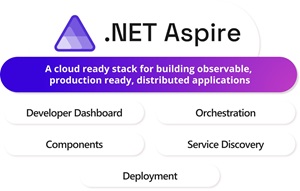Building an AI-Powered .NET Aspire Application
AI's transformation of software development sees more and more groundbreaking tools and frameworks empowering developers to build more intelligent and efficient applications. Among these advancements is the ability to integrate large language models (LLMs), vectorized data, and robust cloud-based services to create AI copilots that can transform how users interact with software.
For VSLive! blog readers, of course, that means using Microsoft tooling like Semantic Kernel with Azure OpenAI Service and Azure Cosmos DB -- with the help of .NET Aspire.
And that's what will be used in an upcoming session titled "Building AI Copilots: Integrate Semantic Kernel, Azure OpenAI, and Azure Cosmos DB with .NET Aspire," presented by Justine Cocchi, a Senior Program Manager at Microsoft, during the Visual Studio Live! developer conference in Las Vegas March 10-14. This introductory-to-intermediate session offers attendees a hands-on guide to building an AI-powered application step-by-step. From generating embeddings on user input to leveraging Azure Cosmos DB's cutting-edge DiskANN vector indexing and search capabilities, the session is designed to demystify the process of building Generative AI applications using a Retrieval-Augmented Generation (RAG) pattern.
 "We'll walk through how .NET Aspire provides consistent client initialization patterns for Azure Cosmos DB and Azure OpenAI as well as how the Aspire dashboard simplifies debugging in development."
"We'll walk through how .NET Aspire provides consistent client initialization patterns for Azure Cosmos DB and Azure OpenAI as well as how the Aspire dashboard simplifies debugging in development."
Justine Cocchi, Senior Program Manager, Microsoft
Cocchi's session aims to equip developers with actionable insights to seamlessly integrate the tools mentioned above into .NET Aspire applications. Microsoft has been heavily pushing .NET Aspire lately, a cloud-ready stack for building observable, production-ready, distributed, cloud-native applications with .NET, helping devs with orchestration, components, tooling, service discovery, deployment and more.
 Source: Microsoft
Source: Microsoft
Attendees are promised to gain a comprehensive understanding of the foundational concepts, explore practical techniques for enhancing scalability and performance, and leave with a solid framework to create their own AI copilots.
Ahead of the event, we caught up with Cocchi to learn more about the technology, the session and how attendees can prepare for it.
VSLive! What inspired you to present a session on this topic?
Cocchi: Generative AI applications have been trending for some time now, and I wanted to walk attendees through some best practices. From choosing a database that can seamlessly scale as your app grows like Azure Cosmos DB, using frameworks that help you manage infrastructure and code like .NET Aspire and Semantic Kernel, to following patterns that allow for contextually accurate results like the RAG pattern -- there are many factors that make a successful AI application.
How does .NET Aspire interoperate with the core components and functionalities of Semantic Kernel, Azure OpenAI, and Azure Cosmos DB to facilitate the development of AI copilots?
.NET Aspire is helpful while developing and deploying any production-grade .NET application, and AI copilots are no different.
We'll walk through how .NET Aspire provides consistent client initialization patterns for Azure Cosmos DB and Azure OpenAI as well as how the Aspire dashboard simplifies debugging in development.
How do Semantic Kernel and .NET Aspire specifically work together?
Semantic Kernel and .NET Aspire are both orchestration frameworks that can help you manage your application. While Semantic Kernel helps orchestrate the AI components in your code, .NET Aspire is useful for managing the service dependencies and various projects in your solution. These two components work together to ensure you can focus energy building your business logic instead of worrying about how to set up your project.
What common challenges might developers face when integrating these technologies?
One of the challenges is keeping up with quickly changing libraries and AI LLMs. Relying on frameworks like Semantic Kernel to help you orchestrate the AI components in your application instead of writing all the functionality in native SDKs can help reduce the burden of underlying API changes. Knowing what tool to use when is critical to maintaining performance while reducing developer toil.
How can developers optimize the performance and scalability of AI copilots built with this technology stack, particularly concerning data processing and response times?
There are a few ways to ensure performance remains high as your application scales. It's critical to pick a database that can keep response times low as more data is added. We'll talk about DiskANN vector indexing in Azure Cosmos DB, which is built for performant vector searches over large data volumes. Slow response times can also come from the LLM generating chat completions, especially when large amounts of context are passed in. We'll dig into managing the amount of chat context sent with each new request and patterns for semantic caching to reduce overall response times on repeated questions.
What resources would you recommend for developers to get up to speed in this space and prepare for your session?
There are many great resources to learn about building copilots with Azure Cosmos DB, Azure OpenAI, Semantic Kernel and .NET Aspire. The session is based on the demo application in this repository. You can also refer to the AI Samples Gallery and the Azure Cosmos DB vector search documentation.
Save $400 when you register for VSLive! Las Vegas Developer Training Conference (March 10-14) by the Super Early Bird savings deadline of Jan. 17.
Posted by David Ramel on 01/13/2025